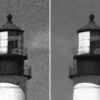Source Code
tvreg: Variational Imaging Methods for Denoising, Deconvolution, Inpainting, and Segmentation
Chan-Vese | Image Deblurring | Image Denoising | Image Inpainting | Image Processing | Image Segmentation | Total Variation |
| Attachments | Size |
|---|---|
| 618.68 KB |
| Added | 01 Dec 2009 |
| Updated | 05 Sep 2011 |
| OS | All OS |
| Language | C |
| Attachments | 1 file(s) |
The tvreg package applies total variation (TV) regularization to perform image denoising, deconvolution, and inpainting. Three different noise models are supported: Gaussian (L2), Laplace (L1), and Poisson. The implementation solves the general TV restoration problem
![]()
to perform denoising, deconvolution, and inpainting as special cases. It is efficiently solved using the recent split Bregman method. Also included is an efficient implementation of Chan-Vese two-phase segmentation.
Please see the included documentation file tvreg.pdf for details.
Get Started Quickly
- Install the FFTW3 library. Windows users can download precompiled DLL files from http://www.fftw.org/install/windows.html.
- Compile the programs with GCC using make -f makefile.gcc or Microsoft Visual C++ using nmake -f makefile.vc. See section 7 of the documentation for help.
- Try the demos
tvdenoise_demo Total variation denoising demo tvdeconv_demo Total variation deconvolution demo tvinpaint_demo Total variation inpainting demo chanvese_demo Chan-Vese segmentation demo
Get Started Quickly in MATLAB
Compiling is not required to use tvreg in Matlab. Try the demos
| tvdenoise_demo | Total variation denoising demo |
| tvdeconv_demo | Total variation deconvolution demo |
| tvinpaint_demo | Total variation inpainting demo |
| chanvese_demo | Chan-Vese segmentation demo |
For improved performance, run the included script complex_mex.m to compile the main computation routines as MEX functions. This requires that FFTW3 is installed, please see section 7.3 of the documentation.
This material is based upon work supported by the National Science Foundation under Award No. DMS-1004694. Any opinions, findings, and conclusions or recommendations expressed in this material are those of the author(s) and do not necessarily reflect the views of the National Science Foundation.



